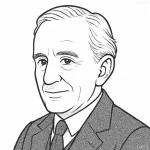“I was never top of the class at school, but my classmates must have seen potential in me, because my nickname was ‘Einstein.'”

- January 8, 1942 – March 14, 2018
- British
- Theoretical physicist, science writer
table of contents
Quote
“I was never top of the class at school, but my classmates must have seen potential in me, because my nickname was ‘Einstein.'”
Explanation
In this quote, Stephen Hawking reflects on his early academic life and the nickname “Einstein” given to him by his classmates, which is both a lighthearted and affectionate tribute to his later scientific achievements. Despite not being the “top of the class” during his school years, this anecdote highlights an important aspect of Hawking’s personality and intellectual development: the recognition of his potential by others. Hawking’s mention of this nickname reveals that, even though he may not have been an immediate standout in terms of grades or outward performance, those around him could see a future brilliance in him, perhaps due to his curiosity, his unique way of thinking, or his ability to solve problems.
The fact that his classmates referred to him as “Einstein” also subtly hints at Hawking’s growing interest in science and mathematics from a young age, even if he was not yet fully aware of the vast potential his mind held. This nickname, tied to the iconic Albert Einstein, symbolized a future trajectory that Hawking would follow in his own way—becoming one of the most influential theoretical physicists of the 20th and 21st centuries. The playful nature of the nickname also speaks to the way in which humor and social interaction are often intertwined with the way people perceive talent and potential in informal settings.
Hawking’s reflection on this nickname is a reminder that academic success does not always follow a straightforward path. Potential can be recognized and nurtured in different ways, even if it’s not immediately apparent through traditional metrics like grades or awards. This story exemplifies how early recognition of an individual’s unique abilities can shape their confidence and lead them to achieve great things, even if those abilities are not fully recognized at first. It also serves as an important lesson about how we view intelligence—as something that can manifest in a variety of ways, not just in obvious, conventional forms, but also in creative thinking and the pursuit of passion.
Would you like to share your impressions or related stories about this quote in the comments section?




